The Legislature’s Joint Committee on Housing held two by-invitation informational hearings last month. Our Director of Public Policy, Nathanael Shea, and our board’s Policy Chair, Jay Coburn of Community Development Partnership, delivered testimony on behalf of MACDC. You can find our full testimony here (which was submitted as written testimony after the hearing). You’re able to watch archived streams of the two hearings here (this is the one we testified at) and here (this is the follow-up hearing). In addition to MACDC, there was fantastic testimony delivered by many of our affordable housing allies, including CHAPA, MAPC, MA Law Reform Institute, Homes for All, Abundant Housing MA, and many others.
News
Economic Development Updates June 2025
June 13th, 2025Join The Mel King Institute and Our Partners for Fundamentals of the Opportunity Finance Industry
Please note: this course is for MassDevelopment Grantees Only.
Opportunity Finance Network and the UNH Carsey School Center for Impact Finance have partnered to bring to you the Fundamentals of the Opportunity Finance Industry certificate course. This three-week course will take you through three modules focused on the following topics:
- History, Context and Current Status of the CDFI Field
- Financial Analysis of CDFIs and CDFI Loans
- Impact Measurement and Public Policy
Live virtual classes, readings, guest speakers, and assignments will develop your knowledge and capacity of community development finance to productively contribute to expanding your organizations' capacity and impact.
Joint Committee on Community Development and Small Businesses Hearing
On Tuesday May 27th, Yari DeJesus, Director of Economic Development at MACDC, and Kim Lyle, CEO of Dorchester Bay Economic Development Corporation and Chair of MACDC’s Board of Directors, participated in an Informational Hearing held by the Joint Committee on Community Development and Small Businesses. They shared pressing challenges facing small business owners in the Commonwealth, including those served by Dorchester Bay, particularly around social, economic, and environmental barriers to growth. They emphasized the importance of increased support for Community Development Financial Institutions (CDFIs), especially in light of potential reductions to the federal CDFI Fund, and called for sustained investments in the small business technical assistance program that help entrepreneurs navigate administrative and financial hurdles. They also highlighted the critical role of microlending in expanding access to capital for underserved entrepreneurs, particularly for small-dollar loans used for working capital, inventory, equipment, or startup costs. The testimony offered both a sobering look at current challenges and practical recommendations to strengthen the Commonwealth’s small business ecosystem.
| Kimberly Lyle, CEO, Dorchester Bay | Yari DeJesus, Director of Economic Development, MACDC |
Health Equity Updates June 2025
June 13th, 2025Thank you, Grace!
Our Health Equity Intern, Grace, is leaving MACDC after having recently graduated with her master's degree in Community Development and Planning from Clark University this past Monday! This Summer, Grace will be starting a full-time position as an Associate Project Manager at Preservation of Affordable Housing (POAH) through the Kuehn Charitable Foundation Fellowship, working to develop equitable affordable housing throughout the Commonwealth.
Welcome, Taylor!
Taylor J. Robinson, MPH, PhDc is MACDC’s new Health Equity Intern. Her work supports the planning and implementation of MACDC’s Housing Quality and Health Equity Initiative.
Taylor is currently a doctoral candidate at the Harvard T.H. Chan School of Public Health, where she studies the intersection of housing, environment, and sleep health through the lens of social epidemiology. As a T32 trainee in Sleep, Circadian, and Respiratory Neurobiology at Harvard Medical School, her research interrogates how neighborhood environments, housing conditions, and environmental exposures shape sleep quality in Boston and the wider U.S. population. Her dissertation leverages Fitbit data and indoor temperature measurements to inform community-driven policy solutions.
Prior to her doctoral training, Taylor earned her MPH in Epidemiology and her BA in Communications and Applied Statistics from the University of Pittsburgh. She has previously worked as a Rappaport Public Policy Fellow at the Executive Office of Housing and Livable Communities. Her commitment to housing justice and health advancement is also reflected in her work with the NIH, the CDC, the National Community Reinvestment Coalition, and Harvard’s FXB Center for Health and Human Rights. In her free time, you can find her at a local Boston theatre, in the garden, or attempting a new Southern style recipe!
Massachusetts Healthy Homes Program Coalition
Our next MHHP Coalition meeting will be on July 17th at 10am. Please let me know if you would like me to send along the Outlook invitation for that meeting.
Lead Paint Webinar
MACDC hosted a free webinar for homeowners on how to identify and address lead paint in their homes or rental units they own on Thursday May 1st. The webinar featured speakers from the MA Department of Public Health, local rehabilitation agencies, lenders, and others. The need for this webinar came out of our Community Engagement work in Gateway Cities as part of our Housing Quality and Health Equity Initiative. You can check out the recording of the webinar here. Please feel free to share with your networks!
June 2025 Housing and Real Estate Updates
June 13th, 2025Division of Banks Awards More Than $3.5 Million for CDCs and Other Nonprofit Agencies Counseling Homebuyers and Homeowners
On May 29, 2025, the Healey-Driscoll Administration’s Division of Banks (DOB) awarded more than $3.5 million in grants to 24 nonprofit organizations to fund first-time homeownership education programs and foreclosure prevention counseling centers throughout Massachusetts. These awards- the highest annual awards in the program’s history- were made under the “Chapter 206 Grant Program”- named after the Chapter in the groundbreaking 2007 law enacted in response to the nation’s financial and foreclosure crises. Despite the current fiscal challenges faced by the Commonwealth, this year’s Chapter 206 awards by the DOB affirmed the importance of these proven counseling agencies which assist homeowners who are experiencing financial hardship and prospective homebuyers who are determining if homeownership is right for them.
As in prior years, MACDC Members led the way, with 16 collectively receiving more than $2.6 million, three quarters of funding awarded, including awards to the following organizations:
ACT Lawrence
Allston Brighton CDC
Asian CDC
Codman Square NDC
Community Development Partnership
Franklin County Regional Housing and Redevelopment Authority
Lawrence Community Works
Neighborhood of Affordable Housing
NeighborWorks Housing Solutions
NewVue Communities
Somerville Community Corporation
South Middlesex Opportunity Council
Southeast Asian Coalition of Central MA
Urban Edge
Way Finders
Valley Community Development
We are grateful to the DOB for its able stewardship and championing of the Chapter 206 Program, and to the Healey-Driscoll Administration and the MA Legislature for their support for the Program.
From the MACDC GOALs Survey, we know that CDCs provided homebuyer counseling to almost 5,700 households in 2024, and foreclosure prevention counseling to more than 600 households. It’s a powerful combination: sound public investment coupled with a high-capacity nonprofit program delivery system. Since the inception of the Chapter 206 Grant program in 2008, DOB has awarded more than $30 million to organizations that have collectively assisted more than 109,000 consumers.
MACDC Convenes Forum on Acquisition Strategies, Launches Broader Initiative
On May 20th, MACDC hosted an Acquisition Forum at Urban Edge, bringing together CDCs, public and private intermediaries, and other experienced practitioners. The assembled 59 practitioners, in-person and online, discussed the challenges associated with acquiring properties characterized as Naturally Occurring Affordable Housing, or “NOAH,” residential properties offering some level of affordability but not publicly subsidized.
The Forum launched MACDC’s Acquisition Strategies Initiative (ASI), a Community of Practice, with support from The Boston Foundation. The acquisition of NOAH properties can be an important affordability preservation and anti-displacement strategy in rapidly appreciating real estate markets.
The Acquisition Forum was highlighted by three panels:
-
The current landscape in the City of Boston
-
The current landscape outside Boston’s city limits
-
The path forward on property acquisitions
We will follow up with two peer learning sessions over the coming months, and the ASI will culminate with MACDC authoring a report summarizing the learnings, assessing the different strategies, and providing resources for further exploration.
We will invite all the individuals from MACDC Member organizations who participated in the May 20th Acquisition Forum to participate in two 90-minute virtual peer learning discussions, as follows:
- Monday, June 23rd at 2 p.m.: The discussion focus will be on best practices in acquiring NOAH properties.
- Wednesday, July 23rd, at 2:30 p.m.: The discussion will focus on public policies to support NOAH property acquisitions.
If you did not attend the Forum, and would like to be part of acquisition strategies conversations going forward- or just want more information about the ASI- reach out to MACDC’s Director of Housing, Don Bianchi (donb@macdc.org) or MACDC’s Data and Equity Specialist, Gracie Theobald-Williams (gracietw@macdc.org). We’d welcome your participation!
Recording of Healthy Homes Webinar: “Better Homes Through Better Health: Identifying and Addressing Lead Paint in Massachusetts Homes”
May 12th, 2025Recording of Healthy Homes Webinar: “Better Homes Through Better Health: Identifying and Addressing Lead Paint in Massachusetts Homes”
On May 1st MACDC hosted a webinar for property owners on how to identify and address lead paint in their homes and in rental units they own. The need for this webinar came out of intensive conversations with community leaders in Massachusetts Gateway Cities.
The webinar featured speakers from the MA Department of Public Health, local rehabilitation agencies, lenders, and others. You can check out the recording of the webinar here (note that you can listen to the webinar in English or Spanish through this link) and view a PDF of the slides here. Please be in touch with Elana Brochin (elanab@macdc.org) or Don Bianchi (donb@macdc.org) with any questions.
Grabación del Seminario Web sobre Viviendas Saludables: “Mejores viviendas gracias a una mejor salud: identificación y tratamiento de la pintura con plomo en los hogares de Massachusetts”.
El 1 de mayo, el MACDC organizó un seminario web para propietarios, sobre cómo identificar y tratar la pintura con plomo en sus viviendas y unidades de alquiler. La necesidad de este seminario web surgió tras intensas conversaciones con líderes comunitarios de las ciudades de puerta de entrada (Gateway Cities) de Massachusetts.
Este seminario web contó con la participación de ponentes del Departamento de Salud Pública de Massachusetts, así como agencias locales de rehabilitación, entidades crediticias y otros. Para ver la grabación del seminario web, haga clic aquí (usando este enlace, podrá escuchar el seminario web en inglés o en español) y envíe un correo electrónico a Elana si desea un PDF de las diapositivas. Si tiene alguna pregunta, sírvase contactar a Elana Brochin (elanab@macdc.org) o a Don Bianchi (donb@macdc.org).
April 2025 Economic Development Updates
April 16th, 2025Informational Webinar: April 9, 2025, at 11 AM – Register here
More Info & Apply: Social Enterprise Capital Grant Program
-
April 23, 9:00–10:15 AM: Mastering Financial Management
-
April 30, 9:00–10:15 AM: Banking Services & Securing Financing
-
MA SBA Team: Provided updates on lending programs, technical assistance, and small business support in the current political and economic climate.
-
Sarah Sargent, Valley CDC: Highlighted their CDC small business programs, success stories, and partnerships that bolster local entrepreneurship.
-
Raymond Lanza Weil, Common Capital: shared insights on CDFI initiatives, funding opportunities, and impactful collaborations that help underserved entrepreneurs succeed.
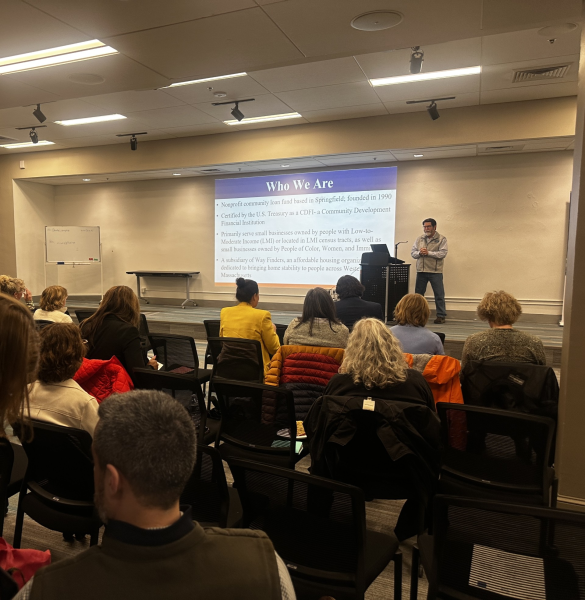
April 2025 Health Equity Updates
April 16th, 2025Health Equity Updates, by Elana Brochin
Health Equity Committee
At our most recent Health Equity Committee meeting we continued our conversation about the intersection of Health Equity and Environmental Justice with partners from the Massachusetts Environmental Justice Round Table. The Health Equity Committee will be meeting next on Monday June 16th at 2pm. Please contact Elana (elanab@macdc.org) if you’d like to join us.
Massachusetts Healthy Homes Program Briefing
We partnered with the Massachusetts Environmental Justice Roundtable to hold a legislative briefing focused on two indoor air quality bills and funding for the Massachusetts Healthy Homes Program (MHHP). MACDC’s Director of Health Equity, Elana Brochin, and Revitalize CDC’s Assistant Manager of HRSN Healthy Homes, Aneida Molina Flores, were among the speakers at this well-attended briefing. Please see attached press release. Please contact Elana (elanab@macdc.org) if you'd like to join our next MHHP Coalition meeting.
Housing Quality and Health Equity Initiative Expanding Focus to Lynn, New Bedford, and Worcester
For the first two years of our Housing Quality and Health Equity Initiative we focused our community engagement efforts on an initial cohort of Gateway Cities: Brockton, Springfield, and Holyoke. For the next two years we will be working in a second cohort of Gateway Cities, including Lynn, New Bedford and Worcester. We are excited to be collaborating with CDCs, community members, and municipal officials in each of these cities.
Lead Paint Webinar
The Massachusetts Association of Community Development Corporations (MACDC) is hosting a webinar for property owners on how to identify and address lead paint in their homes and in rental units they own. This webinar will be provided in an online format and will feature speakers from the MA Department of Public Health, local rehabilitation agencies, lenders, and others. The webinar is free, but registration is required.
Please note the webinar is strictly educational in nature, not regulatory. MACDC will not share the names or email addresses of registrants with anyone.
Date and time of the webinar: May 1st 6-8 pm EST
Registration link: Healthy Homes Webinar
For outreach materials (in Spanish, Portuguese, and Haitian Creole) or general questions about the webinar, you can reach out to Grace Dowling from MACDC, at graced@macdc.org
Highlights from Lobby Day 2025
April 16th, 2025We were thrilled to have over 250 people join us for MACDC's Annual Lobby Day at the State House on April 10th. Learn more about our 2025 legislative priorities here.
Below are some of our highlights from the day. Photo credit: Leise Jones.
Representative Manny Cruz, presented with his Community Development Champion Award by Felicia Pierce, CEO of North Shore CDC.
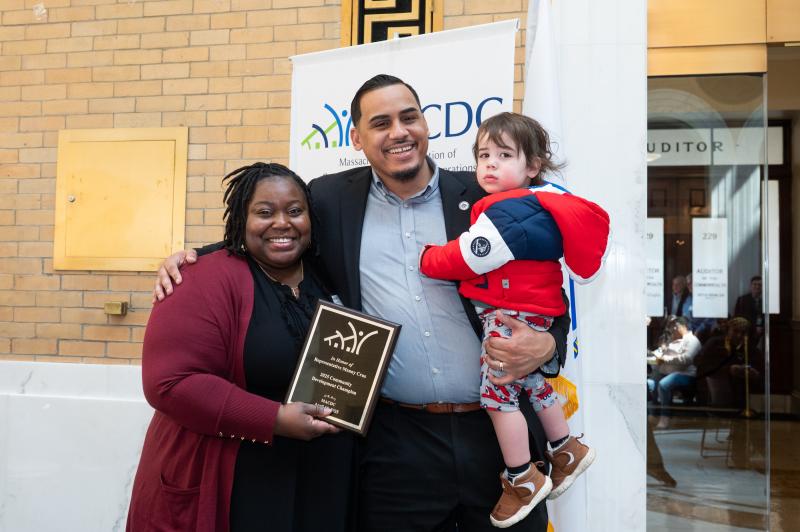
Senator John Keenan, presented with his Community Development Champion Award by Rob Corley, CEO of NeighborWorks Housing Solutions, with Emilio Dorcely, CEO of Urban Edge.
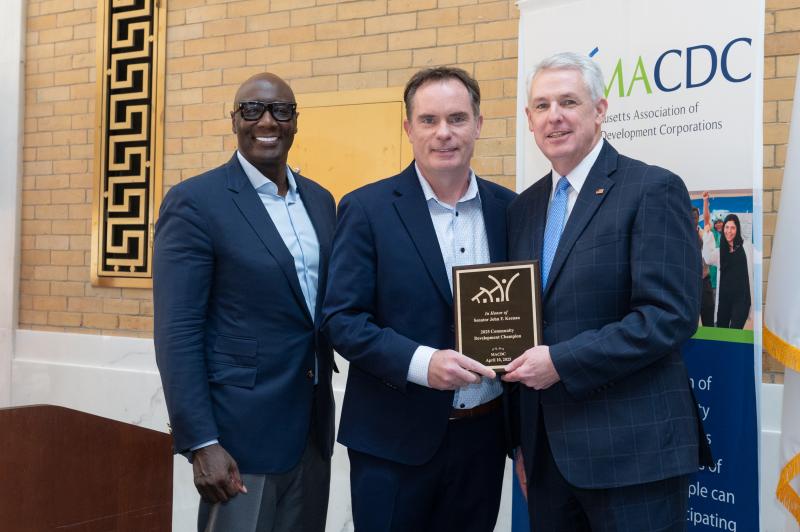
Sandy Maynard of The Neighborhood Developers presenting the Community Development Champion Award in honor of Senator Sal DiDomenico to his staff.
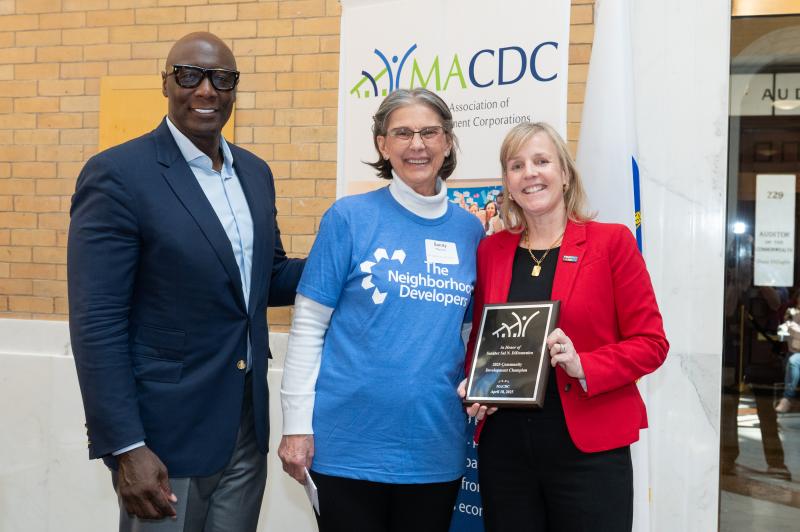
Representative Jay D. Livingstone was presented with a Community Development Champion Award by Suneeth John of Fenway CDC, pictured here with Emilio Dorcely, CEO of Urban Edge.
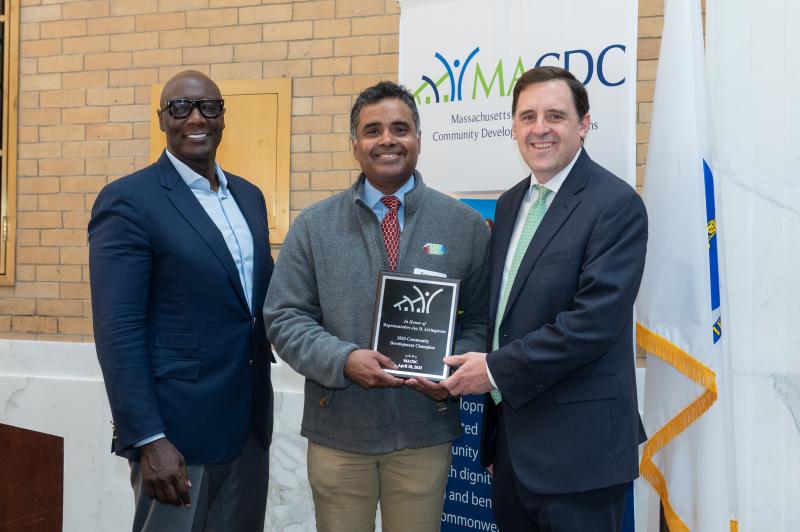
MACDC Director of Policy Nathanael Shea presenting Legislative Staff Champion Awards to Emerson Gagnon and Madison Colburn.
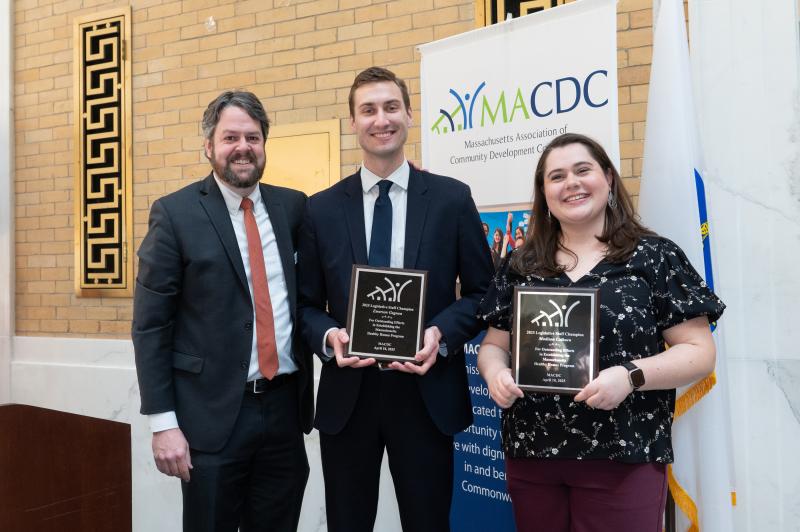
Representative Sam Montaño spoke on the impact of CDCs and investing in housing and climate.
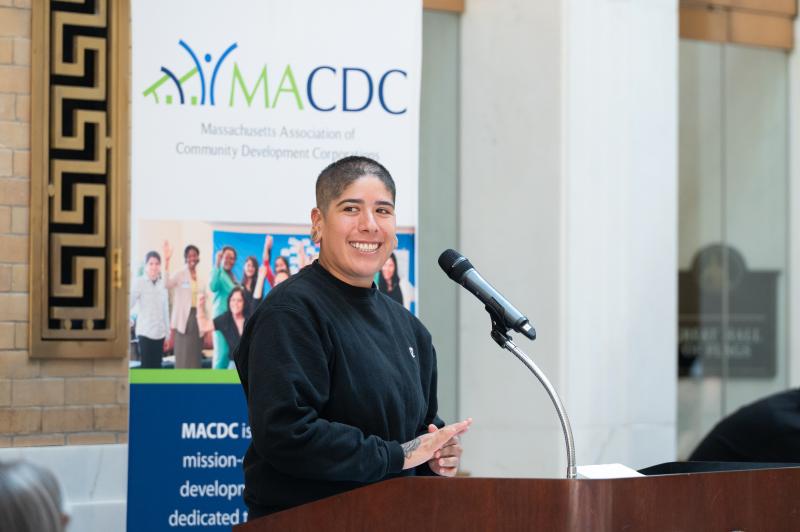
"The impact of community development organizations is felt across the commonwealth and was especially present in the State House for MACDC advocacy day. It was an honor to have come from the CDC world to then being an advocate for them on beacon hill as a Rep. I’m so proud of the work MACDC is doing to advance and strengthen our communities." --Rep. Montaño.
Representative Andy Vargas spoke on the importance of supporting small businesses and the impact of SBTA.
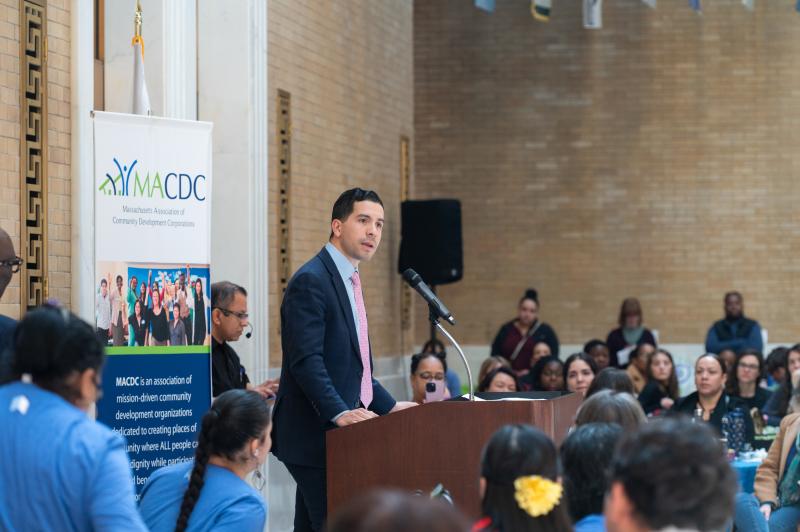
MACDC Board Members
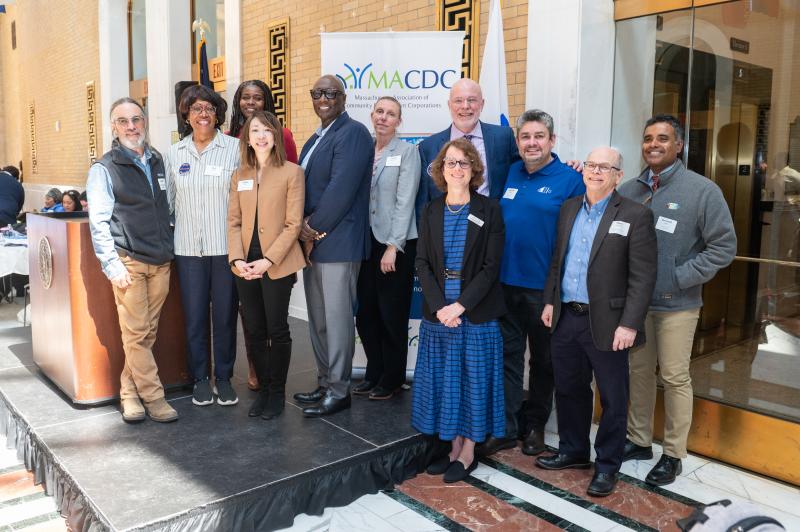
Wealth Building Programs: How CDC’s are addressing the racial wealth gap
December 2nd, 2024Franklin County CDC Racial Equity Pledge Profile
November 19th, 2024It has been four years since the MACDC Racial Equity Pledge was launched, and we feel that now is a good time to reflect on it and the impact it has had on our partner CDCs across the state. To do this, we met with a few representatives from our partner CDCs to ask them how adopting the Pledge has affected their work.
Franklin County CDC is based in Greenfield, Massachusetts, and has been serving the central and western regions of the state since 1979. Their main objectives include providing business development education, access to capital, and commercial office and manufacturing space.
Executive Director John Waite recalls that FCCDC signed onto our pledge “a little over a year ago. We were not one of the first ones, although, I’ve talked to a lot of the CDCs. I go to a lot of the meetings. I think we’ve been working on racial equity, trying to integrate it into our programs, maybe longer than some other CDCs.” FCCDC eventually adopted the pledge to show their solidarity with the other signers.
According to Traci Talbert, FCCDC’s Racial Justice and Community Engagement Leader, their main goal for racial equity work is
to examine everything that we do and ask ourselves, “how are we embedding [racial justice] into our programs and making it a part of everything we do daily?” instead of [having] racial justice as a separate program that we offer as a CDC. We began to examine language. We've examined documents, job postings, [and] looked at what the disruption of white dominant culture actually means. We've been we have our racial justice meetings monthly, and we come together. We read together. We… even feel pain together.
One of the programs being offered by FCCDC is the Racial Justice Reflective Journey. Traci describes it as a series of questions for participants to respond to, then to reflect on their responses. She elaborates by stating that the Journey is
a space for you to just be with yourself and respond to these sessions and… questions in a way that is honest for you, so in the moment, you're able to reflect and say, “Man, I didn't realize that was who I was when I showed up at work,” or “I didn't realize that that's how I behaved,” or “I never thought there was another response to this.”
As of August 2024, around 200 people have participated in in the Journey, and feedback from participants has been good, although some white participants have expressed feelings of discomfort during their self-reflection.
Another program that FCCDC offers is a virtual monthly workshop called Linguistic Bias: What’s the Harm? These sessions focus on identifying and discussing commonly used words and phrases that perpetuate social inequity. However, FCCDC have not limited their focus on minimizing linguistic bias to their monthly workshops. Traci mentioned that FCCDC has also purchased “a software called Textio... We got it one year, and it just was this buzz of helping individuals upload their written documents into the software to help them create a more neutrally toned document.”
John and Traci also said that FCCDC has made a significant adjustment to their hiring practices. Instead of seeking out applicants who would be a good fit to their culture, they are actively looking to add complementary members from all cultural backgrounds. Traci elaborates, “we don't do a ‘perfect fit.’ We're looking to add to our culture, and not looking for culturally fit people.”
Looking ahead, Traci plans to develop a complementary session to FCCDC’s monthly linguistic bias workshop that focuses on “when we judge people based on how they say things. That's something I'm going to be developing because I remember… somebody said they were in a job [interview]… and because of the way they said, “Ask,” they ended up being disqualified from the pool of applicants. FCCDC aspires to continue integrating racial equity into their everyday work and focusing on people who haven't had opportunity to develop wealth as well as those who have been harmed in the past to ensure that they are equitably serving their target communities in Greenfield and western Massachusetts.









